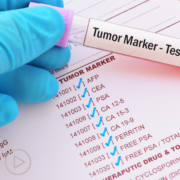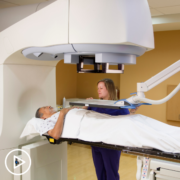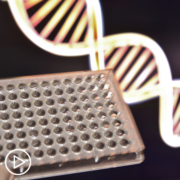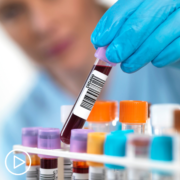Which Prostate Cancer Treatment Is Right for You? What You Need to Know from Patient Empowerment Network on Vimeo.
What do you need to know before deciding which treatment is best for YOUR prostate cancer? Dr. Maha Hussain discusses the role of key tests in choosing therapy, including biomarker testing, provides tips for partnering with your care team and reviews recent research news.
Dr. Maha Hussain is the Deputy Director of the Robert H. Lurie Comprehensive Cancer Center of Northwestern University. Learn more about this expert here.
Download Guide
See More From INSIST! Prostate Cancer
Related Resources
Transcript:
Katherine:
Hello, and welcome. I’m Katherine Banwell, your host for today’s program. Today, we’re going to discuss how to access the most personalized prostate cancer therapy for your individual disease and why it’s essential to insist on key testing. Before we meet our guest, let’s review a few important details.
The reminder email you received about this program contains a link to program materials. If you haven’t already, click on that link to access information to follow along during this webinar. At the end of this program, you’ll receive a link to a program survey. Please take a moment to provide feedback about your experience today in order to help us plan future webinars.
Finally, before we get into the discussion, please remember that this program is not a substitute for seeking medical advice. Please refer to your healthcare team about what might be best for you.
All right, let’s meet our guest today. Joining me is Dr. Maha Hussain. Dr. Hussain, would you please introduce yourself?
Dr. Hussain:
Sure. Thank you, Katherine.
It’s my pleasure to join you. And to the audience, nice to meet you all virtually. My name is Maha Hussain. I am a genitourinary medical oncologist with a focus on prostate cancer and bladder cancer. And I am a professor at Northwestern University Feinberg School of Medicine, Department of Medicine, and endowed professor there. And I also serve as the deputy director for the Robert H. Lurie Comprehensive Cancer Center of Northwestern University.
Katherine:
Wonderful. Thank you so much for taking time out of your busy schedule to join us today.
Dr. Hussain:
My pleasure.
Katherine:
I’d like to start by asking about developments in prostate cancer research and treatment. Experts recently gathered at the annual American Society of Clinical Oncology meeting, also known as ASCO, to share their research.
So, what were the highlights from that meeting that you feel patients should know about?
Dr. Hussain:
I think probably perhaps I can focus on two major – what I would consider major highlights, and those were the results from two randomized Phase III clinical trials.
One of the trials is called the VISION trial. And the VISION trial was a Phase III randomized trial evaluating lutetium-PSMA-617 treatment in patients with metastatic castration-resistant prostate cancer. And the delightful thing about this study is that that study was positive. The PSMA story has been really going on for a few years now. And there’s the PSMA for purposes of scans, imaging, to assess the cancer. And the FDA just approved a PSMA PET imaging this year.
I think it was in May when it was approved. And that would help better define if the cancer is spread or not, and it help with the decision regarding treatment. But the second part is treatment purposes, so identifying the cancer location and trying to attack it with a specific sort of targeted attack to the tumor is really important.
And so, the FDA is currently looking at this particular agent. And I am hopeful that we will hear soon from the FDA, hopefully before the end of the year, and maybe – who knows? – maybe by summer, middle summer or end of summer. Because I do think that would be a major benchmark in there. And so, that’s one thing.
The other clinical trial that I thought was interesting from a data perspective – and for disclosure, I am one of the investigators on this study. And this was an intergroup Southwest Oncology, or SWOG, sponsored clinical trial. So, it’s a federal study that Dr. Aggarwal presented. And this was a study that was aiming at maximizing, again, the anti-tumor therapy with the use of a drug which I call is the younger brother of abiraterone.
So, abiraterone is a drug that is FDA-approved and has been around for several years right now for both castration-resistant prostate cancer and certainly hormone-sensitive metastatic disease. And so, TAK 700 (Orteronel) is a younger brother, I call it, of abiraterone. And one of the potential advantageous when this trial was designed was the fact that you don’t need to use prednisone. And the trial was completed. It was a national clinical trial. And what was interesting is that there is certainly what appears to be a potential benefit, but not in terms of the conclusive based on the way the study was designed.
Having said that, what I thought was remarkable is that patients who basically were only on the control arm was LHRH therapy, so this could’ve been like Lupron, Zoladex, or something like that plus bicalutamide, which is what we call combined androgen deprivation. And that was sort of like the strongest control arm we could do at the time when the trial was designed.
Remarkably, the patients who were on that arm had a median survival of basically 70 months. That’s the median. That’s the bell-shaped curve with the number in the middle. Seventy months is probably the longest ever in any other randomized trials in this disease space, in the hormone sensitive space. So, that tells us is that men are living longer with prostate cancer, even though it’s metastatic disease; and, yes, it’s not necessarily curable, but men are living longer. And it’s a function of all of the better treatments that are supportive care and everything that was going on.
And so, the control arm, as I mentioned, was the 70.2 months. The actual experimental arm was about 81.1 months. And again, I don’t know where things will go from this. Obviously, I’m not the sponsor not the FDA. But the point here is that men are living longer, and so wellness and health become even more so important than we ever did. And as I tell my patients, every day you’ll live longer. The odds of living longer is there because of better treatments coming on.
So, to me – not to take too much time from the interview – to me, these were the two highlights: new, approved – I’m sorry, new treatment that I’m hoping will be FDA-approved and, obviously, the fact that men are living longer.
Katherine:
How can patients keep up to date on the research that’s going on?
Dr. Hussain:
I’m a bit biased, obviously. I’m a member of ASCO.
And what I would recommend to my patients is to look at the cancer.net website. The cancer.net is a website that is an ASCO-generated website specifically for patients and families to review. It is vetted. The committees are not run just by physicians, oncologists, a multidisciplinary team, but also patient representative. So, the lingo and the presentation are lay-friendly, I call it, there.
The other part I would say, the NCI website, and the American Cancer Society, the American Urological Association. I would say there’s a lot of stuff on the media. The difficulty is vetting what is sort of fake, what is not so accurate, or bias versus there. I also think that the NCCN has also some resources for patients.
And one thing I always tell patients: explore, look, but make sure that you talk to your doctor about the meanings of everything because sometimes it can be not – it could be misleading, I should say, or maybe not very clear on what the implications are.
Katherine:
Right. One thing that’s a topic on the mind of many people right now is COVID.
Dr. Hussain:
Yeah.
Katherine:
Is the COVID vaccination safe and effective for prostate cancer patients?
Dr. Hussain:
The answer is yes and yes. So, I have to say, by default, I deal mostly with older men. Age brings in other comorbidities. And certainly, while I see all kinds of shades of gray in terms of the disease extent, going all the way from newly diagnosed all the way to end-stage disease, the bulk of the patients I end up seeing tend to have more systemic disease and have other issues going on. And I have to say, surprisingly, less than a handful of my patients had the infection.
Only one required hospitalization with supportive measure, but not even needed incubation; however, he needed a lot of CPAP and other respiratory support. I’m not aware of any of my patients or my colleague’s patients who deal with prostate cancer that have died from COVID. So, I would say that’s the good news and that we have not seen a big hit in the population that I deal with.
I also know that I would say 99.9 percent of my patients have opted to be vaccinated, and they have tolerated the vaccine just fine. There’s only one case, which I actually even saw just this week, who had been vaccinated but have a very, very severe end-stage disease with significantly compromised bone morrow, who got infected but hospitalized for a few days and is recovering.
And so, I would say just by the pool of patients I see, my answers are yes and yes.
Katherine:
Very good. Thank you.
Dr. Hussain:
And I would encourage all the audience to go get vaccinated. I myself am vaccinated. And I’ve advised all my family members to be vaccinated, just to clarify that too.
Katherine:
Good. Good to know. Dr. Hussain, we’re going to spend most of this conversation talking about advanced prostate cancer. But before we move on, would you give us a brief overview of the stages of prostate cancer?
Dr. Hussain:
Absolutely. So, with any cancer, we count sort of like four stages. But I would say in prostate cancer the biggest thing is when the cancer is newly diagnosed, which could be confined to the prostate or locally advanced, meaning the cancer has gotten outside the capsule of the prostate but still within that pelvic region.
There is the group of patients who have pelvic lymph nodes at time of diagnosis. And of course, that is the patients who have systemic disease, which would be technically stage four. Now, the systemic disease implies any abnormality that is found on scans that is beyond the public region. So, that could be lymph nodes in the back of the belly. That could be thoracic lymph nodes. That could be neck nodes. That could be lung lesions, of course, or bone, or liver.
Now, the most common area where the cancer goes to is really – when we talk about metastatic disease – is the bone. And then lymph is another area where the cancer goes to. Prostate cancer that is confined to the prostate is curable in the vast majority of patients. There is a category of men who undergo surgery or radiation, and then their PSA begins to go up afterwards.
And this is what we call biochemical relapse. And this is a situation where we know that, in all likelihood obviously, especially of the patients who have had their prostate out, that the cancer has spread. With the current imagine, a good chunk of times, we do not find anything because we’re able to pick up PSA that goes from undetectable to 0.2 to 0.3, but there’s not enough cancer to show up on the scans. We’re hoping, obviously, the better scans, the PET Axumin scan, the PSMA scans are going to help us to identify sites of metastases.
But this is a group of men where if there is no cancer visible and the only thing we’re dealing with is PSA that’s going up, if they’ve had surgery, then there’s room for what we call salvage therapy with radiation and hormonal treatment. The case is a bit different if there’s only just the prostate – if radiation was given previously. And of course, we talked about metastatic disease.
Katherine:
Yeah. Once someone has been diagnosed, what tests are used to help understand the aggressiveness of their disease and their overall prognosis?
Dr. Hussain:
Well, I think there is different basic things, as in, what was the extent of the cancer? How did it look under the microscope? And what is the PSA levels? So, these are the general things. There are different sort of genomic panels that the urologist will use to kind of decipher and other things to kind of help with figuring out aggressiveness and things like that. What I would say is this, is a patient who is diagnosed and has a cancer, and at a minimum has what we consider a Gleason 7 prostate cancer – so, that’s the scoring system that is done with the original Gleason score, or the new patterns where it’s talking about intermediate risk to high risk – to me, this is a cancer that needs to be treated.
And again, that’s all to do with if a person has other comorbidities, they have some other terminal condition that’s a separate story. But talking generically, that would be when we would recommend. And these are the patients that are generally not seen by the medical oncologist. They’re seen by the urologist, and then they can refer them to radiation oncology also for consultation.
Katherine:
Now that we understand how test results can help inform a patient’s cancer and how it may behave. Let’s discuss how they can affect treatment options for men with advanced disease. First, let’s do a brief review of the treatment types currently available. There’s hormone therapy, right. What else?
Dr. Hussain:
Perhaps, it’s simpler if we focus on advanced disease, specifically metastatic disease.
So, if that’s the deal, then the backbone of treatment is hormone treatment. And it really is. We call it hormone, but technically it’s an anti-hormone. What we’re trying to do is shut down the hormonal pathway that stimulate the testes, which is the factory that makes testosterone. So, we are looking at shutting down testosterone production from the testes in order to starve the cancer.
Now, the male hormone is produced predominantly – somewhere about 95 percent of it is made by the testes, and then there are about 5 percent-ish that comes from other sources. These are, again, male hormones like the adrenal gland and so on. And there was a while ago some research – I want to say from the MD Anderson crowd, but this is two years ago – that suggested also that the tumor may start to make sort of in-house production of male hormone to support itself.
Now, having said that, again, testes continue to be the source of the majority of the male hormone. And so, historically, the first data that showed benefit was actually by surgically removing the testes, which is what we call orchiectomy or bilateral orchiectomy. And then medications began hitting the market and were evaluated in the late ’80s and then 1990s, beginning with Lupron – which by the way, in the ’80s, it was an injection that the patient had to give themselves every day, which is remarkable.
But even then, there is a personal preference by patients to go and take injections as opposed to go through surgery with orchiectomy. But still, I would say for some patients it may be an option until it ought to be discussed as an option. Then what we know is this, is because of the potential other sources for the male hormone, the concept of what we call combined androgen depravation was being evaluated.
And again, this goes back to the ’80s when the first drug was flutamide and then bicalutamide, and there are other drugs that became. And they kind of added a sprinkle, I call it, to survival. But it wasn’t dramatic, huge differences in survival. And so, generally, while we used it, everybody believed in using it. Moving forward, the drugs like abiraterone, enzalutamide, apalutamide are the three hormonal drugs that have demonstrated conclusively really an advantage in terms of prolonging life when added to the Lupron.
So, what I tell my patients is that, when it comes to hormone treatment there is really no way around it. You can delay it. Some people are exploring for some patients who don’t have a lot of cancer, maybe a couple of areas, maybe just do targeted radiation and then leave the person alone to buy them some treatment-free time.
And, to me, this is where the discussion that has to happen with the patient. What is the objective? Is the objective to kind of be ahead of the game and maximally treat the cancer with the hope of prolonging life? Or is the objective to delay treatment? And I would tell you that, with these types of conversation, nine out of 10 or 9.5 out of 10 men opt for moving aggressively up front with management. So, that’s that.
Now, the one thing I should point out, one of the trials that also was a landmark trial in this disease was the study CHAARTED, which was an intergroup clinical trial at the time it was designed, led by ECOG, and the PI was Dr. Chris Sweeney. I was part of the team that worked on the design also of the study.
And that was a trial that looked at adding docetaxel to hormone therapy, versus hormone therapy alone, to try to see if it adds something. Historically, all the chemotherapies prior to that that were added to hormone treatment for patients with newly diagnosed metastatic disease had not delivered. And docetaxel did.
However, one thing I should point out, based on that trial – and I don’t want to go into too much details for the sake of time – the patients that seemed to be benefiting were the patients that had more aggressive, more disease in their system. And so, liver metastases, lung metastases spread in the bone at different areas, not like few isolated areas in the spine or the pelvis, but much more than that.
And so, for the patients who have what we call high-volume prostate cancer based on scans – and I’m happy to explain what that means if it’s needed – these are the patients that I would offer either the docetaxel plus hormone treatment, which is the injection, or the injection plus the hormonal pills that I mentioned earlier.
Katherine:
What about targeted therapy? How is that used?
Dr. Hussain:
Okay. So, let’s begin with the molecularly targeted therapy. So, as we speak right now, for patients who have newly diagnosed metastatic disease that we call hormone sensitive, molecularly targeted therapy is not standard of care. So, I would encourage patients who may qualify for clinical trial to be involved in those. The flipside is – we can talk about it – is that molecularly targeted therapies, specifically with PARP inhibitors have pretty much entered in the space of prostate cancer with a couple of drugs that were FDA-approved.
The other way of targeted treatment, which would be what we refer to targeted radiation, this would be a different story. This is not systemic treatment. This is a local treatment. And what is done is basically if patients do not have a lot of cancer in their body based on scans, and only certain areas, and they are starting systemic therapy, they can certainly consult with a radiation oncologist to target radiation to areas that are visible on scan. So, if somebody has a couple of, let’s say, pelvic bone lesions, maybe a lymph node, and they are already starting systemic therapy, they can consult with a radiation oncologist focal radiation. And so, that would be the general scheme.
Katherine:
Many patients are confused about the role of genetics and biomarker testing in prostate cancer care.
For people who haven’t heard of some of these terms before, let’s go into the definitions. So, what is genomic or biomarker testing, first of all?
Dr. Hussain: So, I think there’s one thing. Maybe I can explain because the wording can be confusing. So, there is the genetics, and there is the genomics. The genetics would be what we inherit from our families. So, this would be present in our body. The genomics testing would be to look for what the structure of the genes of the cancer itself, cancer cells itself. Now, that doesn’t mean that this was inherited. It’s just that this is a renegade, and it evolved. And that is what is going to show up.
The reason these two are important, both of them have implications potentially for treatment or perhaps clinical trials. And again, with the PARP inhibitors, the BRCA-like genes will have implications for treatment sort of for resistance cancers.
With regard to the genetics, the implications are for, again, inheritance of family and potential risk for blood relatives. Now, there are panels that are FDA-approved for the purpose of genetic testing. And the requirement or the indications right now, anybody who presents with metastatic disease or an aggressive disease and diagnosis, the recommendation is to proceed with the genetic testing, certainly counseling and testing, because there are some people who prefer not to be tested. And that’s something else.
What I tell my patients is this, even if the testing is done and it was negative for inherited genes that might put the patient family at potential higher risk, the fact that a person has prostate cancer by default puts potential, adds risks to family, to blood relatives.
And the risks aren’t just for the males with regard to prostate cancer, but certainly breast cancer, ovarian cancer, pancreatic cancer potentially, and things of that sort. So, this is where I think a patient needs to be discussing with their doctors. And certainly, there are many centers that have genetics counselor, and so that’s where I generally refer my patients to. I counsel them myself, and then refer them also for more discussions with genetics counselor.
Katherine:
What exactly are genetic mutations? And how do they impact a treatment path?
Dr. Hussain:
Well, I think, again, it’s the changes that happens in specific genes that may promote the aggressiveness of a cancer. And so, the BRCA gene is one of the oldest genes that have been identified in breast cancer. And essentially, the body regulates itself.
And when cancer cells come up and they sort of – the body no longer sustains that regulation, the genetic regulation in those cancer cells. Those cancer cells will behave the way they want to. That means that they’re going to grow faster. That means they could be resistant to treatment and things like that. And so, that’s what we check for, these alterations. And there are certain medications that would allow – and again, in prostate cancer, it’s not a lot. It’s just, as I said, right now the only things that are proven is the PARP inhibitors. This is essentially to kinda gang over the cancer cell, preventing from allowing it to repair itself so it can continue to grow.
Katherine:
Some patients may not know if they’ve received these important tests. So, for patients that aren’t all that sure, what key questions should they be asking their physician or their specialist?
Dr. Hussain:
So, I would say when it comes to the genetics testing, I believe a patient has to consent.
Because again, we live in the U.S., and this is a private matter for the patient. So, this generally has to be the case. Otherwise, depending on the institution, sometimes some tests will require for the overall testing for looking for any genetic alterations, general tumor alternation. Different centers have different things. But the patient should ask and say to their doctor, “Have my cancer genes been tested? Have my genes been tested? And if they have, what are the results?” Because we generally share with the patients once it’s been done.
The other things I should point out, some of the good things that have happened recently. Up until recently, when it comes to the tumor genomic testing, tissue was required. Nowadays, the FDA has approved blood tests that several companies now run that can actually collect blood sample and basically test it for circulating tumor cell genes there.
Now, no testing is 100 percent perfect. But in situations like patients with prostate cancer who may not have recent tissue or adequate tissue for testing, certainly doing the blood test to verify if there is anything reflective of the genes of the cancer, and that may allow for potential actionable-type treatments. Again, up until now, this is more going to apply for potential clinical trials or resistant metastatic disease.
Katherine:
Are there other important factors to consider, like a patient’s age, that can help them access the best treatment for their prostate cancer?
Dr. Hussain:
Yes. And I think that age is one factor. What I say and what I tell my fellows, age is to be respected, but used to discriminate in terms of management.
We all age. And certainly, the body reserve is not the same. And so, that’s why I would say that has to be respected. But it doesn’t mean that we cannot treat patients.
And I’ll tell you, it’s interesting. There are times where you have – I have a gentleman who used to run seven miles a day. He was 87 years old. This was in my days when I used to be in Ann Arbor at University of Michigan. And the gentleman came to me, and he said, “Dr. Hussain, I don’t feel good.” And I said, “Sir, why? What has happened?” “I can’t run like I did before.” And I said, “You’re not running?” “No, I am running. I’m just not able to do seven miles a day. I can do only four miles a day.” I’m like, whoa, that’s about 100% more than I do.
Now, again, I’m bringing this as an extreme example. But for some of the oral agents, like the Olaparib trial, there were men in there literally late-’80s, early-’90s that were included in the clinical trials. Same thing goes for several of the other trials.
I do think that functionality is important. So, if somebody comes to you so sick they are in a wheelchair, you really have to be very careful. And again, I’m just using kind of extremes. And so, you have to be careful by what you are able to do. And any time the doctor thinks the odds are going to be more harm than good, this is really where absolutely a situation where the physician needs to be careful about it, and the patient needs to understand it also. At the end of the day, it’s a shared decision.
Katherine:
Before we close, Dr. Hussain, how do you feel about the future or prostate cancer research, and what would you like patients to know?
Dr. Hussain:
First, let me say that I would love for the patients to know that they are a partner, a most critical partner in the process.
That we need to continue the research and investment in research. It is research that will end up curing cancer. Wishful thinking will not do it. And patient volunteering, which I think is remarkable across all cancers. The business I’m in, the way that drug discovery and evolution often happen because patients volunteered. And without testing these new treatments and combinations, we will not be able to get better results.
And I will tell you that, when I started my training, the median survival for patients with resistant prostate cancer was on the magnitude of about nine months. Now it is three years-plus. Now, you could argue, well, that’s not huge. But that is a huge change because, again, we’re picking up the cancers much earlier. And the patients who had, as I mentioned, metastatic disease, again, the longevity then at the time I was in training, but even afterwards, was give and take in the three years. And now we’re talking six-plus years.
And so, there’s been tremendous progress. And really partnership with the patients and their families and supportive others is very critical, and investment in research. So, yes, advocate constantly for more investment in research.
Katherine:
All sounds very promising, Dr. Hussain. Thank you so much for taking the time to join us today.
Dr. Hussain:
My pleasure. And be well, all of you.
Katherine:
Thank you. And thank you to all of our partners. If you would like to watch this webinar again, there will be a replay available soon. You’ll receive an email when it’s ready. And don’t forget to take the survey immediately following this webinar. It will help us as we plan future programs. To learn more about prostate cancer and to access tools to help you become a proactive patient, visit powerfulpatients.org. I’m Katherine Banwell. Thanks for joining us.
































Katherine Banwell:
Let’s start with a basic question. What are the stages of colon cancer?
Dr. Krishnamurthi:
Colon cancer is categorized in four stages – stage 1, 2, 3, 4. This takes into account the tumor itself, how thick it is. These tumors start on the inside of the colon, like as a polyp. Then they can grow through the colon wall. The tumor thickness and has it spread to any of the lymph nodes? and has it spread further to a distant organ like liver or lungs?
That’s a tumor node metastasis. Considerations that go into the staging. Stage 1 colon cancer or colorectal cancer would be a very shallow tumor, maybe just in a polyp and hasn’t spread to any nodes or anywhere else. Stage 2 is when the tumor is thicker. It may be involving the full thickness of the colon or rectum but has not spread to any nearby lymph nodes. Stage 3 is when the cancer has spread to regional or nearby lymph nodes. Stage 4 is when it’s metastatic or it’s spread to another organ.
Katherine:
Okay. Thank you.